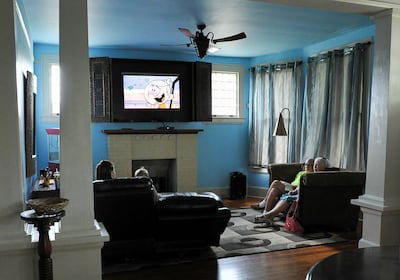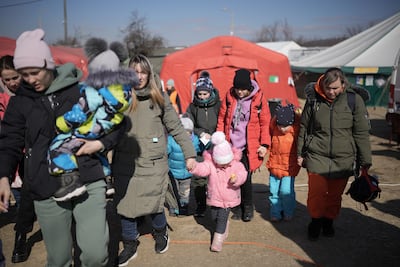Well-intentioned people have booked more than 434,000 Airbnb stays in Ukraine as a way to try and help those directly affected by the ongoing Russian invasion.
A grassroots movement started by Airbnb users to book accommodation in Ukraine with no intention of visiting as a way to donate to those in need has gone viral. The accommodation-booking platform subsequently waived all guest and host fees for stays booked in the country.
People around the world want to help and are using the platform as a way to send money to host families in Kyiv, Odesa, Kharkiv and many other parts of the country.

By March 12, about $15 million had been pledged on the site, according to Brian Chesky, chief executive of Airbnb.
But is booking an Airbnb stay really the most effective way to help those in need?
If I book a stay on Airbnb, am I helping people in Ukraine?
Many Airbnb hosts in Ukraine have indeed received money from stays pledged by those around the world, and hosts have been vocal in their appreciation.
But people booking such stays should be aware that they may not always be giving their money to those who need it most. This is because the most impoverished Ukrainians are unlikely to have listings on Airbnb or even access to reliable internet.
It can be difficult to know exactly who is behind a listing. Airbnb does not identify if hosts listed are professional property managers, investors or just an average person trying to rent out a room.
This confusion has surfaced before. In 2018, Airbnb was found to be in breach of European Union laws by not clearly identifying whether accommodation was being offered by amateur hosts or professionals. The issue was important because the level of consumer rights differ according to the status of the owner.
Who are the hosts listing properties on Airbnb?

Even if you do take the time to read a host's profile on Airbnb, it’s not always easy to figure out exactly who they are.
For instance, a one-bedroom apartment in the centre of Kyiv is listed by a woman named Yuliya. Clicking on her profile, it’s easy to see that her identity has been verified by Airbnb and that she’s been on the site since 2015.
However, clicking through to the next page shows that not only does Yuliya have four luxury apartments for rent, she also lives in Berlin, not in Ukraine.
The National reached out to Airbnb to see if any plans were in place to make it clear which properties on the site are listed by individual Ukrainian hosts. The accommodation provider did not answer the question.
Instead, a spokesperson advised people to read “host and listing profiles thoroughly” and said that the company “always keep measures to detect and deter fraudulent activity under constant review”.
When do people get the money that Airbnb users send them via bookings?

Airbnb’s standard policy is that hosts are paid about 24 hours after guests’ scheduled check-in times. This happens irrespective of whether a guest physically checks in or not.
However, it can take longer than 24 hours for payouts depending on the method selected by Airbnb hosts. International wire payouts take three to seven days, while bank transfer payments typically take about seven days to arrive in hosts’ accounts.
This means that while hosts will ultimately get the money that you pledge to them, there may be much quicker ways of sending funds, especially if the property is fully booked on all dates in the near future.
Does booking an Airbnb stay take a room away from someone who might need it?
One major flaw in the trend of booking Airbnb stays in Ukraine with no intention of travelling there means that rooms could become unavailable for other people to book.
While hosts will benefit by getting money from your booking, people actually trying to find a place to stay, perhaps in a safer part of the country after being displaced, may not be able to find accommodation options via Airbnb as hosts can only accept one booking for each listing on any given date.
Is Airbnb cancelling donated bookings in Ukraine?
Several people who have booked stays in Ukraine via Airbnb have now reported that their reservations were subsequently reversed and refunded.
Bookings may be cancelled automatically owing to hosts not being able to accept reservations in time. If hosts do not have auto-accept reservations turned on in their Airbnb profile, then they have a specified time frame in which to respond to a booking.
With an ongoing war in Ukraine, it is probably not always possible for hosts to accept the funds being pledged to them via bookings.
Twitter user @Marciano has suggested that Airbnb turn auto-accept on for all Ukraine bookings as people there have “more on their minds than to answer Airbnb bookings”.
Hosts in Ukraine have reported having their accounts deactivated after adding new listings or cancelling coming "ghost" reservations to try to be able to accept new bookings and get more necessary funds.
Airbnb did not answer The National's question about why accounts and bookings were being cancelled. However, a spokesperson for the company recently confirmed to Protocol tech website that it had suspended a handful of hosts who "did not support this effort in the spirit intended".
How can I make sure I’m booking a legitimate Airbnb in Ukraine?

There are a few steps to take to help discern if an Airbnb host is really in need.
First, avoid booking a new Airbnb listing. Check reviews and make sure they go back more than a month or so to ascertain that the property has not recently been listed on the site to take advantage of charitable donations since the war started.
Understandably, some Ukrainians may have added listings to the site recently to try to get funds for survival, but scammers and chancers have sadly also had the same idea.
“Guests can look at a host's profile to see how many listings they have and check the history of reviews on the listing to see how long the listing has been active," suggested an Airbnb spokesperson.
Is there a better way to help people in Ukraine?

While most people booking stays on Airbnb simply want to help, there are better ways to ensure that money gets to the people who need it most.
Airbnb’s non-profit arm Airbnb.org has pledged to house 100,000 refugees in short-term accommodation and has banners on the platform — including on Ukraine listing searches — directing users to the website for the initiative. It encourages people in neighbouring countries who can host those fleeing the war to sign up on the platform.
“As of March 13, approximately 36,000 hosts on Airbnb.org are signed up to offer their homes to refugees around the world. More than 21,500 new hosts have signed up in just the past two weeks [from February 28 to March 13]”, an Airbnb spokesperson said.
Some travellers familiar with Airbnb for booking holidays may be more inclined to donate to Ukraine if they are able to do so via a service that they have previously used. So in this sense, donating via Airbnb is likely better than not helping at all.
But there are other initiatives that can better guarantee donations will get to those who need them most. The Red Cross is recognised around the world as a charitable organisation and it is accepting donations for people in Ukraine.
Several other charities are also supporting the cause. Resources such as the BBB Wise Giving Alliance lists charities raising funds for assistance efforts, and Charity Navigator ranks organisations by how confident people can be in donating to them.
Anyone who works in hospitality can connect with Hospitality Helps, a platform setup by Ukrainian Sofia Widmann to connect refugees with available hotel rooms. Several well-known hotel groups including Marriott and Hilton have joined the platform. It currently has 358 supporting hotels in a total of 41 countries.


